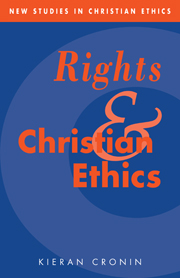Book contents
- Frontmatter
- Contents
- General editor's preface
- Preface
- 1 Metaethics: meaning and justification
- 2 Initial elucidation of rights-language
- 3 Conceptual scepticism and rights
- 4 Moral and theological scepticism
- 5 Imagination, metaethics and rights
- 6 Theological imagination and rights
- 7 Rights, power and covenant
- 8 Theological foundations of rights-language
- Epilogue
- Notes
- Index
General editor's preface
Published online by Cambridge University Press: 29 September 2009
- Frontmatter
- Contents
- General editor's preface
- Preface
- 1 Metaethics: meaning and justification
- 2 Initial elucidation of rights-language
- 3 Conceptual scepticism and rights
- 4 Moral and theological scepticism
- 5 Imagination, metaethics and rights
- 6 Theological imagination and rights
- 7 Rights, power and covenant
- 8 Theological foundations of rights-language
- Epilogue
- Notes
- Index
Summary
This book is intended as the first of a series in two senses. It is the first book of the series New Studies in Christian Ethics. Fundamental to this series is the attempt to bring together recent discussions in philosophy and the social sciences with the very best in Christian ethics. This is meant to be an intellectually challenging series and, as such, it will make heavy demands on contributors. Nothing less is demanded than expertise in both a secular discipline and in Christian ethics.
Dr Cronin fulfils this admirably. He handles difficult philosophical material on the highly important topic of rights with obvious competence. It would be difficult to find another theological work in this area which displays the same level of expertise on this topic. Indeed, it has been an obvious weakness of theologians writing on the topic of rights, that they have seldom shown that they are fully acquainted with what is now a large body of philosophical discussion elsewhere in the intellectual world.
By combining philosophical and theological skills in this way, Cronin conforms very exactly to the aims of the series New Studies in Christian Ethics. He attempts to show that Christian ethics can make a distinctive contribution to understanding rights in society at large – not least in providing distinctively religious reasons for acting morally and in suggesting key models for Christian, as well as for secular, ethics. Cronin's understanding of imagination and models in relation to rights is particularly helpful.
- Type
- Chapter
- Information
- Rights and Christian Ethics , pp. xii - xiiiPublisher: Cambridge University PressPrint publication year: 1993



